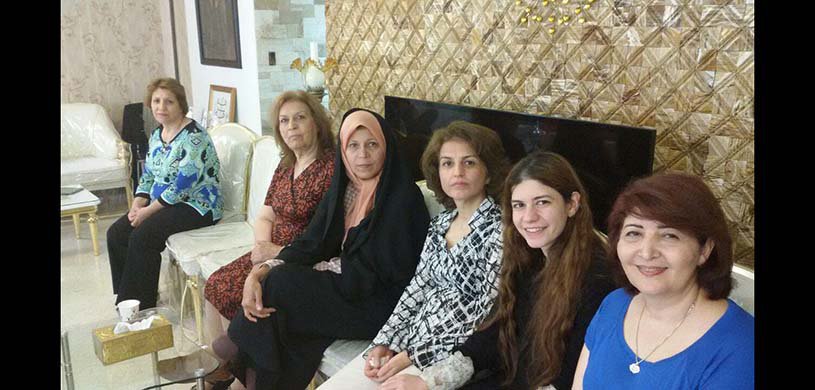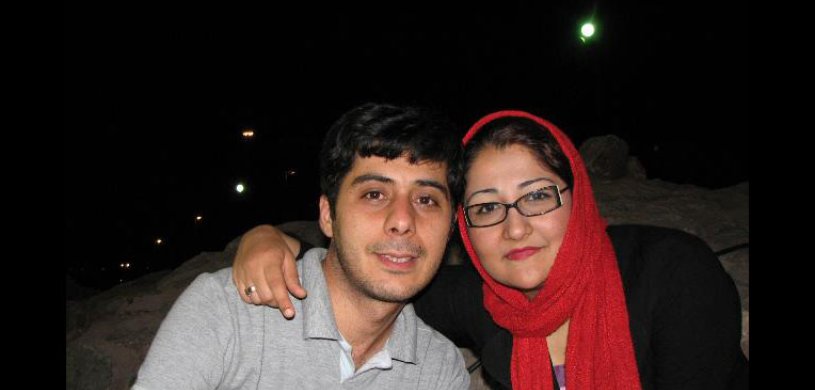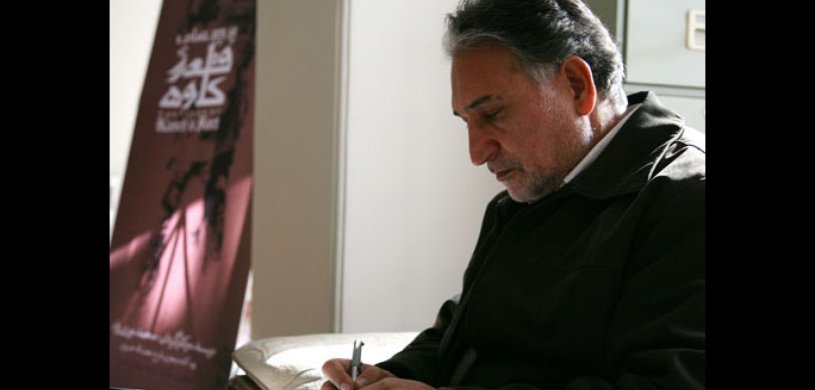Source: en.iranwire.com

Faezeh Hashemi visits Bahai prisoner Fariba Kamalabadi during her temporary leave of absence
“It’s very simple,” tweeted journalist Mahsa Amrabadi on May 16. “When you live for so many months with somebody, you are not just going to miss her, you are going to miss her terribly — especially if that person is Fariba Kamalabadi.”
On May 10, prison authorities granted Baha’i leader Fariba Kamalabadi temporary freedom. She had spent eight years behind bars, and missed some of the key moments in her family’s life, including her daughter’s graduation and wedding, and the birth of her first grandchild. She was told she had five days to catch up with family, and then she would be returned to prison, where she would serve out the remaining two years of her sentence.
But Mahsa Amrabadi and others, including Faezeh Hashemi, the daughter of former president Hashemi Rafsanjani, the human rights lawyer Nasrin Sotoudeh, Sotoudeh’s husband, the graphic artist Reza Khandan, and journalists Zhila Bani Yaghoub and Bahman Ahmadi Amouee jumped at the chance to visit her at her home.

Journalists Mahsa Amrabadi and Masoud Bastani, both banned from working, have voiced their support for Fariba Kamalabadi
Mahsa Amrabadi and her partner Masoud Bastani were among the first journalists to be thrown in jail after the 2009 disputed presidential election. They each received a seven-year prison sentence, and are now free. Both have been banned from journalism, but are active and outspoken on Twitter.
Three hours after Amrabadi’s tweet, Masoud Bastani tweeted, describing one of his experiences while in prison: “The warden came for inspection. He insulted a Baha’i cellmate’s faith. When he looked at me, I said ‘My fellow citizen. I feel ashamed by your behavior.’”
All of Fariba Kamalabadi’s visitors had one thing in common: at one time or another, they had shared a cell with a Baha’i prisoner. “I did not know any Baha’is before going to prison,” said Faezeh Hashemi. “I had no connections to the Baha’i community. By putting me in prison, the Islamic Republic opened a new window in my life. I came to know them.”
“Fifth-Class Citizens”
Filmmaker and former conservative journalist Mohammad Nourizad shared a cell with Baha’is, and he, like Hashemi, changed his views about them. He told the BBC that, influenced by the regime’s propaganda, he once considered Baha’is to be “fifth-class citizens,” but this changed after he met with Baha’i families. He also said he had expected to be attacked because of his visits with Baha’is, but many people — including some members of the Revolutionary Guards and government officials — praised him and told him, “Like you, we are ashamed of how the Baha’is are treated, but we lack the courage to say so.”
Yet Faezeh Hashemi had a very different response from hardliners, many of whom criticized her. Her father has also taken a hard line against the Baha’is, and even described his daughter’s meeting with Fariba Kamalabadi as a “mistake.”
Religious authority Ayatollah Nasser Makarem Shirazi has voiced alarm that a greater number of Iran’s establishment figures have not been more outspoken. “I was waiting to see whether others would object or not,” the ayatollah said — who is known for being a Holocaust denier, despite the fact that his ancestors were Iranian Jews. “Unfortunately, I have heard nothing. Why is everybody else silent?”
But could the “new window” to which Faezeh Hashemi refers and the “silence” that Ayatollah Makarem Shirazi complains about be signs of a changing attitude among Iranians toward Baha’is?

Journalist Mohamad Nourizad shared a cell with Bahai prisoners
Ayatollah Makarem Shirazi is an old hand at being anti-Baha’i. Like many other Shia religious authorities, he has issued forceful edicts against Iran’s largest religious minority. He also played a prominent role in the legal case that sent Fariba Kamalabadi and her colleagues to prison. She and six others were members of Yaran — the “Friends of Iran.” The group oversaw the activities of the Baha’i community after the Islamic Republic shut down the Iranian National Baha’i Spiritual Assembly. Eight years ago, authorities arrested the group. According to lawyer Mahnaz Parakand who, along with the Noble Laureate Shirin Ebadi and two other lawyers, defended the accused, when the case made its way through the court, an assistant prosecutor asked Ayatollah Makarem Shirazi to provide his legal opinion about what should be done to the Baha’is. Responding to the prosecutor’s claims that the group proselytized for their faith, the ayatollah said that if they had done it consistently then the charge of “waging war against God” should be added to their other charges. Relying to a considerable degree on this fatwa, the court sentenced the seven members of Yaran to death, a verdict that the appeals court later reduced to 10 years in prison for each of the seven defendants.
A Marked Change
The arrests took place in 2007. Now, more than eight years later, Fariba Kamalabadi, one of the people Ayatollah Makarem Shirazi believed deserved the death penalty, has now been given a leave of absence from prison — and many Iranian citizens and former political prisoners have welcomed the decision, and flocked to support her.
Considering the Shia clergy’s long history of forceful propaganda against the Bahai’s of Iran, the recent shift is quite remarkable. According to journalist and writer Faraj Sarkohi, the Baha’i faith is the only religion the Shia clergy has responded to by creating a specific organization [the Hojjatieh Society] to combat its activities.
In his extensive report on the subject, Mohamad Tavakoli-Targhi, Professor of History and Near and Middle Eastern Civilizations at the University of Toronto, writes that since 1941 numerous religious and propaganda societies have been formed in Iran — the sole purpose of which has been to fight Baha’is and their beliefs. (Read a summary of the report here.) The most well known of these organizations are the Islamic Promotion Society founded in 1942 and the Society for Islamic Teachings, which was created a year later. According to the founders of the Society for Islamic Teachings, in 25 years, the society founded 170 other cultural societies that focused primarily on destroying the Baha’i faith. Even in the nineteenth-century under the Qajar dynasty, and long before the Islamic revolution, “making the physical elimination of Babis [the precursors to Baha’is] into a joint state-clergy project, the Shia clerics served as the co-architects of a repressive and authoritarian political structure,” writes Tavakoli-Targhi.
Since then, Shia religious authorities have been an essential part of an anti-Baha’i propaganda campaign, issuing numerous fatwas to facilitate their agenda. Over the last several days, Iran’s hardline media have reminded its audience of these fatwas issued by the Supreme Leader Ayatollah Khamenei and other religious authorities. In fact, their opposition to the civil rights of Bahai’s and their hatred of the religious minority is one of the only issues on which they can all agree.
Voices of Dissent
Nevertheless, other religious authorities think differently. One was the late Ayatollah Hossein-Ali Montazeri, the one-time heir apparent to Ayatollah Khomeini, who declared repeatedly that Baha’is be entitled to civil rights and “Islamic compassion”. Another is Ayatollah Abdolhamid Masoumi-Tehrani who as a symbolic gesture, presented a gift to the Baha’i faith, an intricate work of calligraphy citing a passage from the faith’s holy scripture. He also issued a statement saying the gift was “an expression of sympathy and care from me and on behalf of all my open-minded fellow citizens who respect others for their humanity and not for their religion or way of worship — to all the Baha’is of the world, particularly to the Baha’is of Iran who have suffered in manifold ways as a result of blind religious prejudice.”
And there are others. A few months ago, Mohammad Ali Abtahi, vice-president for reformist president Mohammad Khatami, defended the rights of the Bahia’s on Twitter. “In the same way that the government taxes people regardless of their beliefs and their faith, it has a duty to provide all citizens with their civil rights without exception,” he wrote. “Baha’is and Muslims and Zoroastrians…they are all citizens and all pay taxes.”
But even those who remain silent about the recent developments — including the seminary in Qom — are sending a message, as Ayatollah Makarem Shirazi has pointed out in frustration.
Baha’is are banned from higher education and this has also ed many human rights activists to protest against the blatant denial of a key civil right to Iran’s biggest religious minority.
So what next? It is likely that the regime will boost its efforts against the Baha’is, despite the promising signs. It will probably respond to an increase in sympathy with further crackdowns. But across the media, a change is evident: Iranian society is paying more attention to human rights. It’s a topic that the Iranian regime has always tried to avoid when it comes to the Baha’is. As the news agency Mizan, which is affiliated with Iran’s judiciary, has outlined, Iran’s regime leaders are fearful that these visits to Baha’i prisoners, and the widespread reporting of them, will have an impact on how the United Nations reports on Iran and its human rights violations this year, and worse, lead the international body to issue even stronger condemnations that it has done in the past, pointing to the change in Iranian society as evidence of what the people want. The battle against the prevailing narrative about the Baha’is of Iran is well underway, and the battle against the Baha’is has truly been undermined.
May 17, 2016 9:39 pm
God answers our prayers in the way He chooses. I hope that these positive moves are the beginning of justice coming about. I praise the ex-president’s daughter and the Islamic Clergy for their compassion and bravery towards the Baha’is in Iran. God Bless all of you.
May 18, 2016 1:16 am
“Nay, by the One in Whose hand is my soul, they are not, and never shall be able to do this, even should they combine to assist one another. “
June 15, 2016 7:56 pm
The Tablet of Ahmad
http://www.bahaiprayers.org/ahmad.htm
Confirmation
May 18, 2016 10:22 pm
The countdown for the fall of the Shia clergy began when they Martyred The Bab in 1850. Their days are numbered.
May 29, 2016 1:04 am
Except that it is not the Shia clergy who is the real power anymore. I see Iran becoming like Burma (Myannmar) used to be – a brutal nationalistic regime headed by the Revolutionary Guards, with an Islamic veneer. Ironically, the Burmese military, in alliance with fanatic Buddhist priests, are persecuting the powerless Moslem minority as a strategy to keep political power. The Iranian military leaders may try the same strategy with the Baha’is. We really need to pray for them now.